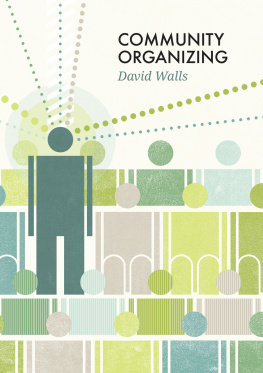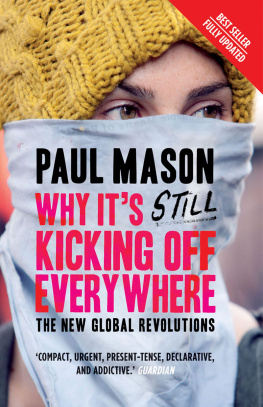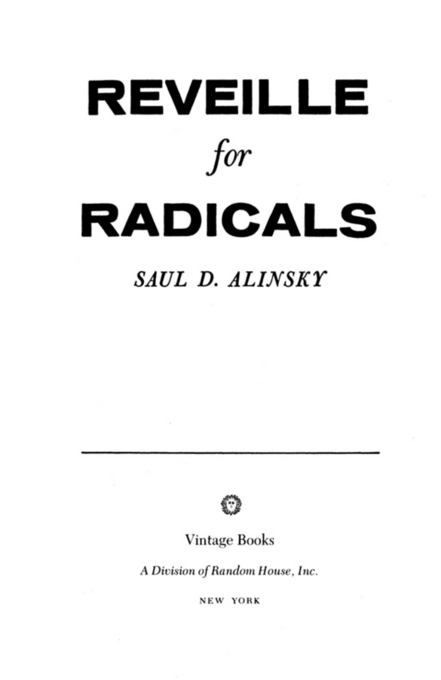VINTAGE BOOKS EDITION, OCTOBER 1989
Copyright 1946, 1969 by Saul D. Alinsky
Copyright renewed 1974 by Mrs. Irene M. Alinsky
All rights reserved under International and Pan-American Copyright Conventions. Published in the United States by Vintage Books, a division of Random House, Inc., New York, and simultaneously in Canada by Random House of Canada Limited, Toronto. Originally published, in different form, by the University of Chicago Press in 1946. This edition was originally published, in hardcover, by Random House, Inc. in 1969.
Library of Congress-in-Publication Data
Alinsky, Saul David, 19091972.
Reveille for radicals/Saul D. Alinsky.
p. cm.
eISBN: 978-0-307-75688-6
1. Community organizationUnited States.
2. United StatesSocial conditions. 3. Social actionUnited States. I. Title.
HN 65.A674 1989
303.484dc20 89-40118
v3.1
To the memory of Helene
Contents
Part I
Call Me Rebel
Part II
The Building of Peoples Organizations
Let them call me a rebel and welcome,
I feel no concern from it; but I should
suffer the misery of devils, were I to
make a whore of my soul.
THOMAS PAINE
Introduction to the Vintage Edition
A GENERATION has passed since I wrote Reveille for Radicals. Reading it after all that time was an eerie, schizy experience. The angry, defiant, go-for-broke, irreverent youngster coming through in these pages seemed almost but not quite another person. At times I found myself saying to him, Cool it, kid, youre taking on a thousand-to-one odds as though it were an even bet; youll learn when you get more experience to watch itif the odds are higher than a hundred to one.
I began to write, As I look back upon my youth but the words stick, for I dont feel an hour or year older. I guess that when you are constantly in the arena of conflict, you just dont have the time to grow older. Life is conflict and in conflict youre alive; action does not admit age into the arena. Sudden death, yes; but gradual age, no.
As I look at Reveille after twenty years of more experience in many different battlefields, cities, with many different peoples, issues, religious institutions and against many different opponents, the question naturally comes up as to what I would change if I were writing Reveille today. For me, the question cant be separated from another: Have I changed and, if so, how? Of course I have changed. It is idiocy to assume that anyone can be alive and not be changing constantly. There are many who go through the years without changing but they are the ones who huddle on a chronological treadmill searching for an illusionary security and something called status. The senility of security and status even afflicts many of the so-called young. They never live. Life is an adventure of passion, risk, danger, laughter, beauty, love, a burning curiosity to go with the action to see what it is all about, to search for a pattern of meaning, to burn ones bridges because youre never going to go back anyway, and to live to the end. Terrified by this dramatic vista, most people just exist; they turn from the turbulence of change and try to hide in their private make-believe harbors, called in politics conservatism; in the church, prudence; and in everyday life, being sensible.
It is in chronological youth when time ahead seems endless that one is tempted to take a chance and liveparticularly so if ones youth takes place, as did mine, in a period of upheaval and massive dramatic change, with the collapse of many accepted values and the opening up of an uncharted future, offering the beckoning adventure of the search for the new life. The accepted values of security, work, and money as the way to happiness went in the great crash of 1929. In the crisis, life became polarized and good and evil stood clear and unmistakable.
The years of the 1930s followed, when I was in my twenties. Days of the great depression, F.D.R.s New Deal, John L. Lewis organized labor revolution of the C.I.O. battling the corporate giants of America; times of compassion which found those in the North and East suffering with the plight of the sharecroppers and Okies of the South and Midwest. A time when black and white moved together in their need for strength in face of the common enemy of unemployment and low wages; the great depression heightened mans awareness and concern for his fellow man. This and more of the same was happening at home while abroad Europe was boiling up a Wagnerian devils brew of unbelievable madness in the twilight of civilization.
The pillars of the past had become tombstones and those which survived were suspect and challenged. Disillusionments child is irreverence, and irreverence became one of my major heritages from an angry, irreverent generation. In this way, I have not changed. I am still irreverent. I still feel the same contempt for and still reject so-called objective decisions made without passion and anger. Objectivity, like the claim that one is nonpartisan or reasonable, is usually a defensive posture used by those who fear involvement in the passions, partisanships, conflicts, and changes that make up life; they fear life. An objective decision is generally lifeless. It is academic and the word academic is a synonym for irrelevant.
I have changed in that I have learned to freeze my hot anger into cool anger and to make my intuitive irreverence conscious, to challenge not only the opposition but myself, to realize and accept the prime importance of the Socratic adage about the unexamined life. Through action, reflection, study, testing, and synthesis I have learned to distill experience from living. Experience is the integrating of the actions and events of life so that they arrange themselves into meaningful universal patterns. Most people distill or digest this product of experience from the actions and events of their daily lives, so that much of it passes through their intellectual systems as segmented happenings and separate memories. I have learned to search for laws of change, to discover for myself such simple truths as that the real action is in the reaction. These and other lessons of the past are the basis for my forthcoming book, Rules for Revolution, which I am now completing. In short, cool anger and conscious understanding based on experience have made my actions far more calculated, deliberate, directive, and effective. Now my actions are designed primarily to induce certain reactions based on an analysis of circumstances. I have learned not to confuse power patterns with the personalities of the individuals involved; in other words, to hate conditions, not individuals. Thus I have learned to become in many ways the master rather than the servant of my tactics, and to develop far more effective tacticseconomic, political, and socialthan the simple, hot, angry, personalized denunciation. One must learn to see ones opponent in the context of circumstances to which one must respond. Understanding these forces enables one to develop the strategy which my opponents describe as Alinsky-style mass ju-jitsu. The opposition is always stronger than you are and so his own strength must be used against him. I have repeatedly said that the status quo is your best ally if properly goaded and guided. I have also learned to avoid succumbing to a rationale which would permit me the escape of becoming a rhetorical radical and not a radical realist. These are a few of the lessons learned from continuous action since I wrote







